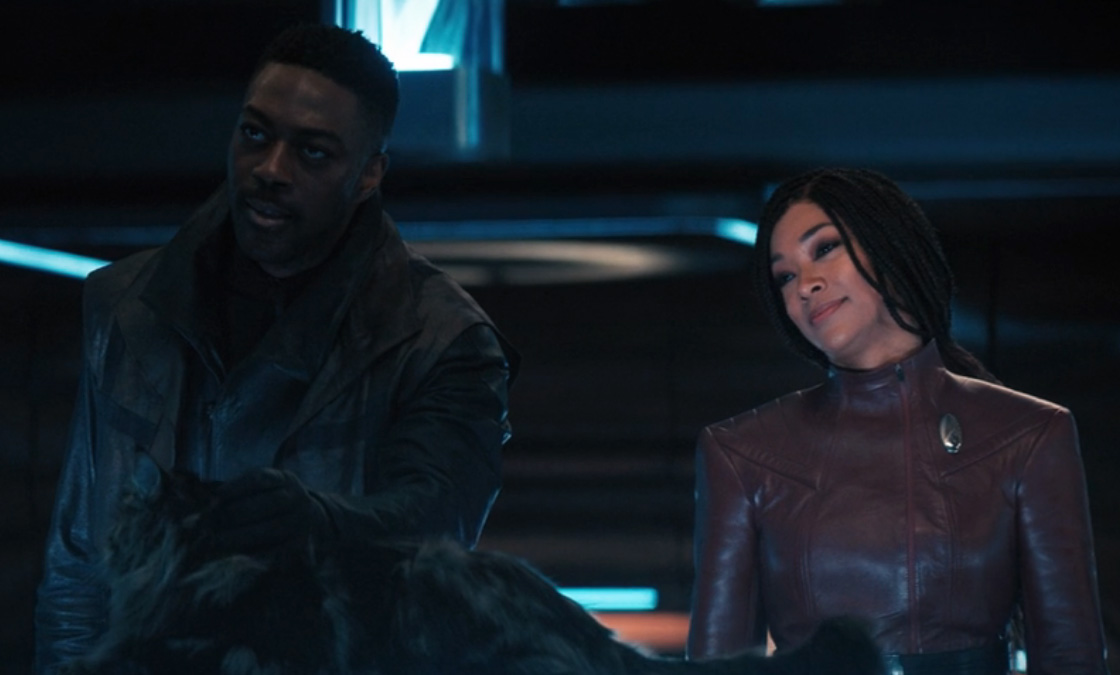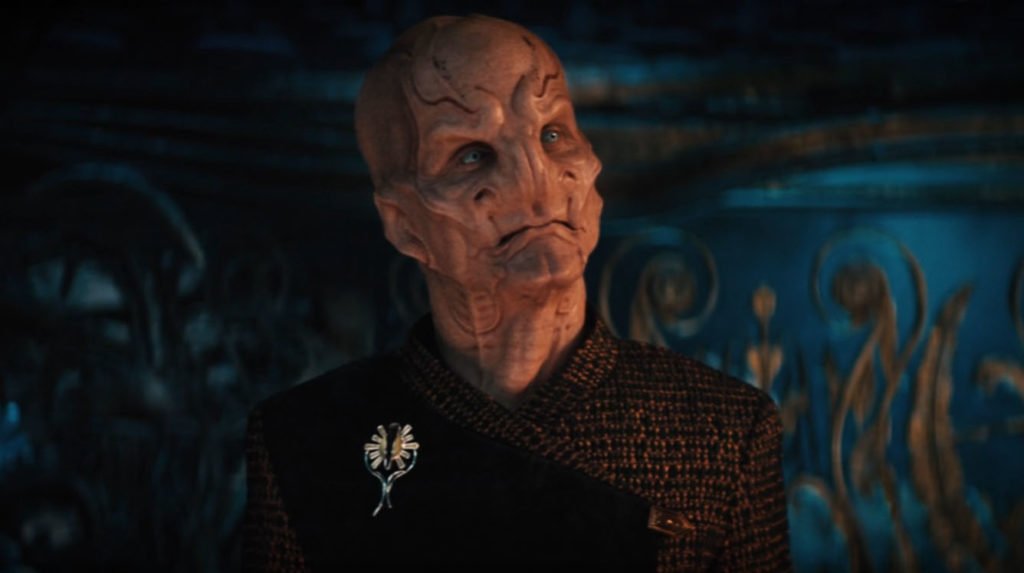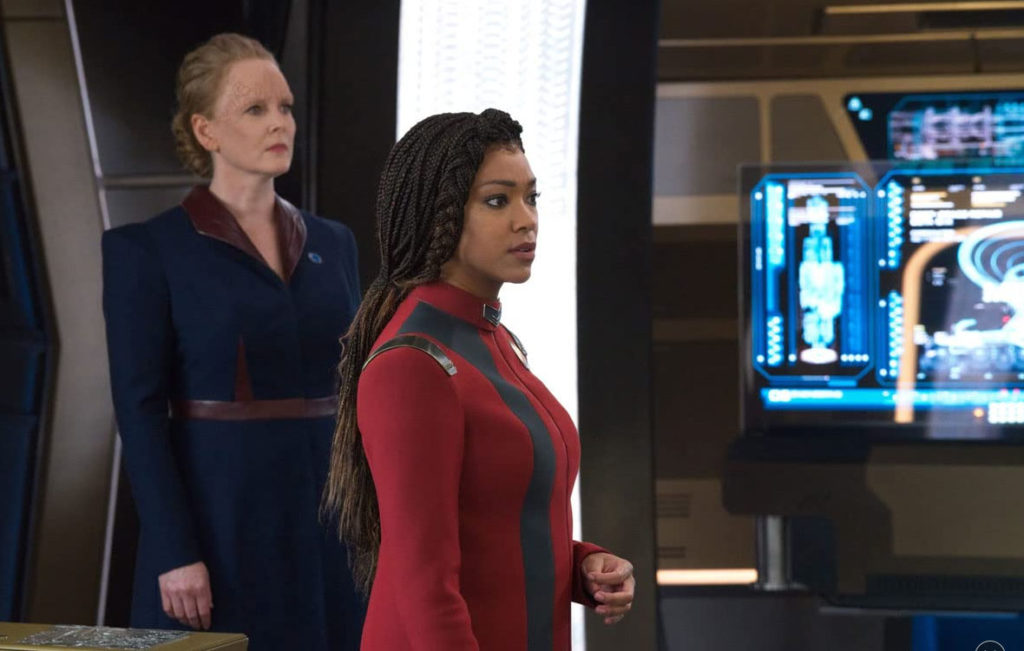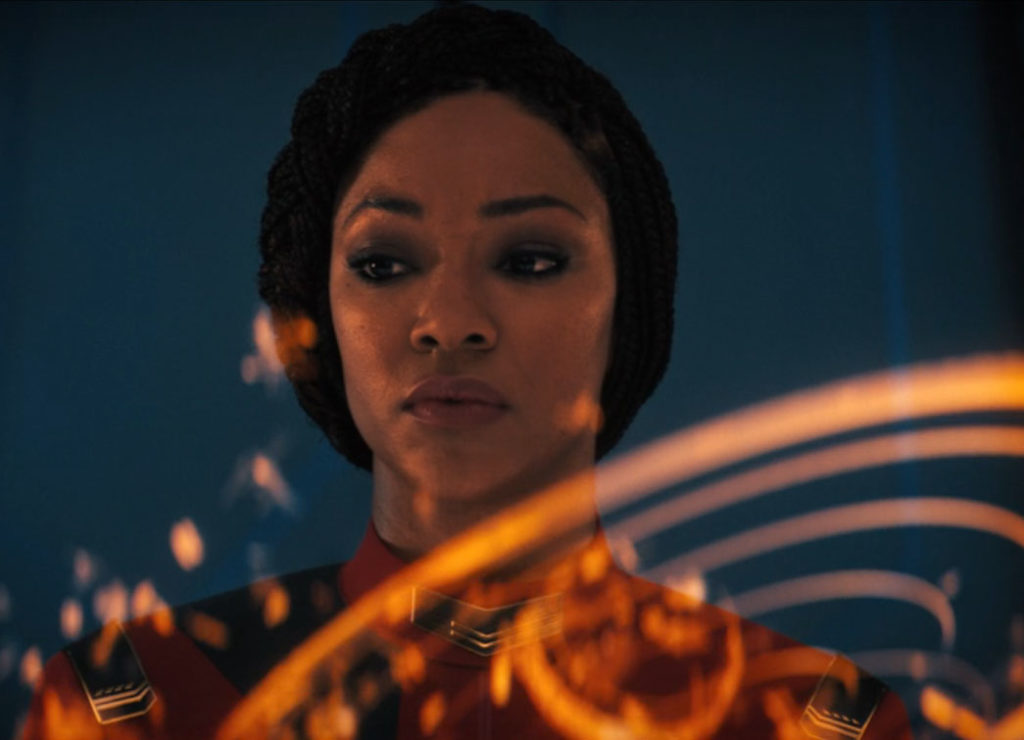
Star Trek: Discovery Season 4, “Kobayashi Maru”
At its best, Star Trek is about hope, community, and justice, all unfolding within a backdrop of wondrous exploration. Straightaway, it’s clear that this season of Discovery aims to tap into those core Trek tenets and set the crew about the work of the original Starfleet business model.

Fresh off solving the galaxy’s dilithium shortage, the fourth-season premiere of Star Trek: Discovery finds the crew busy piecing together a fractured Federation. But reestablishing relations with a planet inhabited by some understandably skeptical butterfly people gets a little bumpy. The first instance of many familiar Trek callbacks to come in this episode has Book and newly-minted Captain Michael Burnham playing the roles of Kirk and McCoy from the prologue of Star Trek Into Darkness.
For a cold open, it’s fun, the effects are great, and, of course, it’s a little silly. It’s also effective. The scene’s meant to orient us to the state of the galaxy and make clear the Federation, after years of contraction, is back in the game of prioritizing peaceful relationships and helping people in need, “no strings attached.”

Back on Kaminar, we learn it’s been five months since the events of season three’s finale. Things on Saru’s homeworld have changed over the last nine hundred years or so. The Kelpiens and Ba’ul are coexisting peacefully and are no longer at each other’s throats.
Saru is an honored advisor to a people who had pulled back into isolationism after The Burn. He’s making the case that his people ought to expand their concept of community and consider the benefits of engaging with the greater galaxy at large. It’s a brief but poignant scene that carries forward the emphasis this season is putting on partnership and cooperation. We’re stronger together than we are on our own. It’s also a not-so-subtle response to what’s happening in our own local galaxy. From Saru’s point that the ‘science is clear’ to his message advocating for a broader definition of community, it’s another longstanding Trek tradition, responding to and commenting on the state of the viewer’s real-world events.
In this vision of the future, the Federation is on the ascendancy for the first time in a long while. We’ve just seen the core mission of making friends and giving aid is well underway, now we learn Starfleet Acadamy is opening its doors again for the first time in over a century. But the brief conversation on the topic between Burnham and Book serves to reveal a particular bias of hers; She has a bad habit of prejudging people’s motives and character when they don’t inhabit her close orbit. Burnham can only see an opportunistic politician capitalizing on Starfleet’s moment of glory, stealing the stage from the people who truly earned the accolades. This is some Philippa Georgiou-level cynicism from Burnham and at odds with the wise and empathetic woman we’ve come to know. Frankly, it’s a bad look for Discovery’s captain.

But while Burnham seems eager to snap to conclusions about the Federation’s new president, Chelah Horsdal’s Laira Rillak makes a gracious entrance, going out of her way to acknowledge everything Burnham and Discovery’s crew have done to get Starfleet to this moment. Furthermore, she’s got a message for the new recruits. It’s well past time that Starfleet get’s back to doing what it does best. Exploring.
Burnham isn’t convinced and seems determined to view Rillak as little more than an empty suit, a figurehead who can only get in the way of serious star trekking business. But the new president of the Federation is not here to indulge Captain Burnham’s worst habits. She’s just not having it. Rillak speaks plainly and has little patience for rhetorical sparring.
Let me just say, it’s a delight to have Horsdal (The Man in the High Castle) on board this season. After last season’s events, there was going to be Michelle Yeoh-sized hole in the cast that needed filling. Hordal’s Rillak is immediately established as Burnham’s foil. She’s here to shine a light on both the best and the worst results of Burnham’s propensity for heroic, sometimes reckless, behavior. Rillak doesn’t precisely utter the words “the needs of the many outweigh the needs of the few,” but we understand the lesson she’s trying to get across to the captain in the wake of the crisis at Deep Space Repair Beta 6.
And Rillak does have a point. In the past, Burnham’s freelancing has typically put only herself in peril. But she’s in a different role now. She’s a captain of a starship and responsible for a lot of lives. Burnham’s refusal to accept that she needs to begin detaching her personal emotions from the duty she’s entrusted with is something indeed, especially for someone who grew up on Vulcan. At her core, this captain is more Kirk than Picard or Janeway and the deeper purpose of the Kobayashi Maru test seems just out of reach.
It’s an unmistakable setup to what promises to be a significant angle for Martin-Green’s character this season. For all we’ve seen her go through, all her triumphs and tragedies, she’s only just now risen to the rank of captain. To see her take on the position without any growing pains or having to look inward would have been a miss. It’s a well-trodden character arc but I’m still fascinated to see how Discovery manages the path, especially once Saru is back in the fold. The prospect of Martin-Green, Doug Jones, and Horsdal sparring throughout this season is an exciting one.

For all the notes of optimism and joy on display at the beginning of the episode, the closing minutes are filled with devastation. The scale of the fallout of Discovery’s rescue mission is dwarfed by the total destruction of an entire planet. It’s a gut punch made all the more visceral by the collective reactions of Book, Burnham, and Rillak.
The staggering loss of life is a clear sign that the scope and stakes of this season are going to be immense. That’s a welcome turn of events after season three. The fallout from The Burn was an interesting disaster for Burnham and the rest of Discovery’s crew to navigate, but the conflict with Osyraa and the Emerald Chain felt a bit small. Whatever’s at the root of the gravitational anomaly wreaking havoc this season seems more on par with what we’d expect from Star Trek set in the thirty-second century.
This is a solid, sometimes breathtakingly gorgeous opener to what looks to be an ambitious season ahead.



